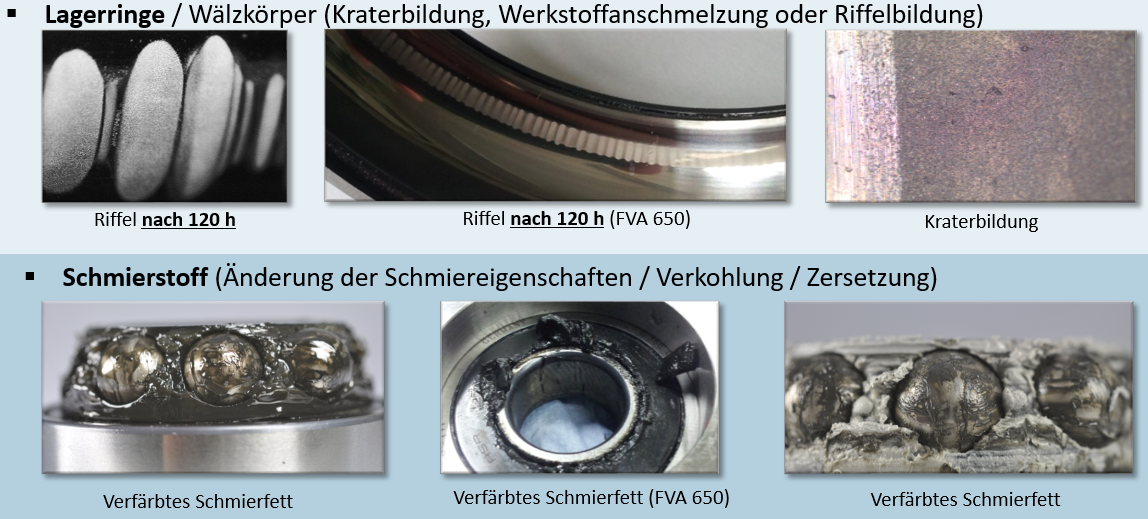DGMK-Project Lubricants
Service life of additivated base oils under electro-mechanical stress
Chair of Machine Elements, Gears and Tribology (MEGT)
Prof. Dr. Ing. Oliver Koch, Dr. Simon Graf, Edward Klemm
As the most populous and economically strongest member state of the EU, the Federal Republic of Germany plays an important role in EU climate policy. In view of the increasing climate change, it has set itself the ambitious target of reducing its CO2 emissions by at least 55 % by 2030 compared to 1990. The transport sector is also expected to make a major contribution to achieving the climate targets by reducing CO2 emissions, among other things. Against this background, e-mobility is increasingly becoming the focus of politicians and car manufacturers. The operation of electric vehicles powered by electricity from renewable sources causes significantly lower CO2 emissions compared to vehicles with combustion engines.
AC motors are predominantly used in electric vehicles. These infinitely variable-speed electric motors are controlled by modern frequency converters that have a high switching speed. However, this can result in parasitic electrical currents that also flow through the rolling bearings installed in the electric motor and damage both the bearing and the lubricant inside. In bearing life calculations, loads due to parasitic rolling bearing currents have not yet been taken into account, or have been taken into account only inadequately. This can lead to unexpected bearing failures, which are associated with a time-consuming and cost-intensive standstill of the vehicle. Effective solutions for suppressing or significantly reducing bearing currents include equipotential bonding elements, hybrid or ceramic bearings. However, their use is associated with high maintenance intensity and costs, among other things.
In this context, the lubricant in the rolling bearing is therefore becoming increasingly important. Depending on its composition and properties, this lubricant can be electrically conductive or insulating and can therefore have a significant influence on the propagation and intensity of bearing currents. When an insulating, non-conductive lubricant is used, the lubricant film in the rolling bearing can become capacitively charged. If the insulating capacity of the lubricant film is exceeded, discharge currents occur between the metallic rolling bearing components separated from the lubricant film. These are so-called spark erosion currents, which cause considerable damage in the bearing (cratering and corrugation in the bearing raceway, lubricant oxidation, etc.). With the aid of electrically conductive lubricants, such capacitive charging of the lubricant film is to be prevented. This is achieved by lubricant manufacturers by adding special additive packages to the base oil. In this way, the (electrical) properties of rolling bearing lubricants can be adapted to the respective environmental and operating conditions. The lubrication of bearings in an electric motor is usually a lifetime lubrication. Under electrical load, the long-term effect of such additive lubricants has not yet been sufficiently researched. Therefore, within the scope of the envisaged research project, various lubricant analysis methods for the investigation of additive lubricating grease base oils aged in rolling contact under electrical load are to be applied and compared with each other in order to develop analytical methods and principles for the determination of the critical lubricant service life. Oil ageing takes place under defined electrical-tribological conditions.
Against this background, additive lubricating grease base oils of different compositions are to be aged in a defined manner and analyzed with respect to their electrical properties within the scope of the envisaged research project. For this purpose, several test benches were developed and set up at the Chair of Machine Elements and Transmission Technology at the TU Kaiserslautern, which realistically represent the electrical conditions in the rolling bearing of converter-fed electric motors. These test benches are characterized by the fact that, in contrast to the real electric motor, the electrical and mechanical operating conditions can be varied independently of each other and thus a wide range of parameters can be investigated independently of each other (electrical / mechanical variation). With the aid of the available test technology and measurement methodology, the following development goals are to be achieved:
- Characterization of the electrical properties of the lubricating oils on a special test rig developed for this purpose
- Ageing of lubricating grease base oils under defined and reproducible electro-mechanical loads
- Comparison of ageing mechanisms with lubricating grease base oils subjected to purely mechanical stresses
- Derivation of the service life reduction based on the additional electrical stress with the aid of various analysis methods such as: IR spectrography, ICP analysis, rheological investigations, RULER method, NMR spectroscopy.
The project has received the grant notification from the BMWK as of October 1, 2023.

Jan Ludzay
Head of the Refining and Product Application Department
Federal Ministry of Economics and Climate Protection